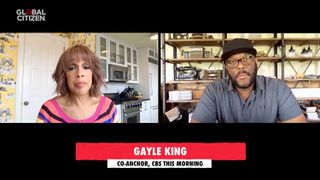See You In September … Or October … Or November

As the pandemic continues to tear up any hint of normalcy in America and beyond, no one expects that the traditional TV season, featuring rookie shows and new seasons of existing shows, will look anything resembling normal in the fall. Pilots have not been shot, and networks will be forced to go straight to series on a script they think has legs. If production can get going this summer, networks will have a chance to roll out some original programming in or around September.
It’s a big if.
“Unless they are significantly up and running in July or August, it’s obvious the season won’t start in September,” media consultant Bill Carroll said. “It is only reasonable to expect there won’t be a traditional start to the season.”
Then there’s the matter of sports. Major League Baseball is already a month late on starting the season, with no word yet on when the first pitch will be thrown. Football is in a better place with its season slated to start in September, but that’s hardly a sure thing. Dr. Julie Vaishampayan, chair of the public health committee for the Infectious Diseases Society of America, told The New York Times she could not imagine the National Football League playing this year.
That would be a giant blow to NBC and Fox in prime, in addition to the Sunday daytime action on Fox and CBS. NBC, of course, will not air the Summer Olympics in the coming months, and National Hockey League and National Basketball Association postseason plans are not yet determined. The NHL, NBA or both might see their championship rounds slated for fall, causing scheduling havoc for the networks.
Executives from ABC, CBS, The CW, Fox and NBC spoke on background, given the sensitive situation and no one’s ability to clearly see what happens down the road, about what the upcoming TV season might in fact look like. They spoke of countless Zoom meetings discussing Plans B, C and D. Some hold out hope that production begins as usual in July and some shows are ready for fall.
“There is a chance the fall schedule looks normal, depending on when we get that first marker, and we can start to think about getting back to work,” one veteran programming executive said. “It’s possible it doesn’t look all that different.”
Broadcasting & Cable Newsletter
The smarter way to stay on top of broadcasting and cable industry. Sign up below
Executives said shows will premiere when they are ready, unlike previous seasons, when the Big Four networks stuck to a launch strategy in late September and The CW debuted new stuff in early October. “Shows will probably premiere in September, October, November,” said the programmer. “I doubt everyone will wait until everything is ready.”
‘Leap of Faith’
Dramas typically begin production in the back half of July and comedies in August. Pilots have not been shot, meaning networks will likely go straight to series on a hot script. It happens on occasion in the broadcast world: The CW went straight to series on Walker, Texas Ranger and Superman & Lois in January. But it is extremely rare, and usually tied to a hot-shot producer. “We may have to take that leap of faith,” one programming executive said.
Sets probably won’t look much like they did before. Expect fewer people on site, masks worn off-camera and distancing for older, more vulnerable cast members. “It’s gonna look different,” said one programming veteran.
One Fox insider said the network’s animated trove, including The Simpsons and Bob’s Burgers, looks mostly intact for fall. Those series’ long production runs have them mostly ironed out before the pandemic struck.

Networks have been scrambling to fill holes in their schedules amidst the pandemic. CBS, for one, debuts a weekly movie night May 3, featuring Paramount Pictures films such as Raiders of the Lost Ark and Forrest Gump. That may be expanded. The other networks are considering similar moves.
“It’s a logical, reasonable interim decision,” Bill Carroll said.
Networks might also consider airing series from sibling networks within their corporate structure. CBS has Showtime and CBS All Access in its group. ABC has FX and Nat Geo. There’s a greater chance that two or three networks may have a couple shows in the can than one network having that. “If there’s a long delay in the start of production, that’s something we might look at,” one network executive said.
News in Prime
With the pandemic a massive news story, networks such as ABC, NBC and Telemundo have been offering primetime news specials. That’s something the networks may do to fill their schedules too. “It’s always an option,” one programming exec said.
Networks will hold summer shows until fall. They may feature more late-night specials in prime, those hosts having figured out to make fresh content. They may air a rerun of a strong show, but with a cast member hosting, and talking about why it’s their favorite episode.
They might also keep a ratings-challenged show that did not appear to be getting a new season, because it’s easier to keep an existing show on the air in an abnormal production landscape than it is to start one from scratch. “A new show has no set, no props, no wardrobe,” one network executive said. “New shows need to get prepped.”
The broadcast networks had a somewhat similar experience with the writers’ strike, which went from November 2007 to February 2008. Programmers around for that challenge said they learned a lot about making contingency plans. While the current crisis has no end date, they said a fiasco occurring in spring is preferable to one in the heart of the TV season.
Preston Beckman, former senior strategist at Fox and chairman of media consulting outfit The Beckman Group, described the game plan of network executives these days. “Planning, planning, planning, planning,” he said. “It’s time for creativity. It’s time for everyone to go, OK, how we do rethink a lot of this?”
Covering Corona

It will be interesting to see how much the coronavirus pops up in scripted show storylines in the upcoming season. Network execs said the series that revolve around real-world stuff will likely dabble in it. “I don’t think you can pretend it never happened,” said one programming veteran. “But I don’t think shows will dwell on it either.”
Sheltering at home is great for ratings. “If we all continue to stay at home, viewership will be significant,” Carroll said. “If we’re not staying in our homes, and the choices are not what we normally anticipate, things will have to adjust to that.”
Netflix — without sports rights to worry about, and viewers’ schedules increasingly open to bingeing — is well-poised to progress through the pandemic. Ted Sarandos, Netflix chief content officer, said the network’s 2020 slate is “largely shot … and we’re pretty deep into our 2021 slate.”
Beckman mentioned how the skyrocketing unemployment levels may see people cut their subscription services. “A lot of people can’t afford their viewing options and will go to over-the-air TV,” he said.
Older viewers, he added, may be less likely to venture out to public settings even after the pandemic dies out, meaning a more mature viewing demographic.
Every network executive who spoke stressed that predicting what the new season will look like is guesswork in late April. They acknowledge that an awful lot has to fall into place for the new season to look remotely like it has in the past, but they have their fingers crossed.
“If we’re not in production in July, plans for September are out the window,” said one exec. “If we’re still sheltering at home in July, we’ve got bigger things to worry about than the primetime schedule.”
Michael Malone, senior content producer at B+C/Multichannel News, covers network programming, including entertainment, news and sports on broadcast, cable and streaming; and local broadcast television. He hosts the podcasts Busted Pilot, about what’s new in television, and Series Business, a chat with the creator of a new program, and writes the column “The Watchman.” He joined B+C in 2005. His journalism has also appeared in The New York Times, The Philadelphia Inquirer, Playboy and New York magazine.

